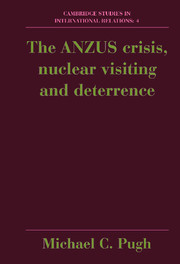Book contents
- Frontmatter
- Contents
- List of tables
- Preface
- List of abbreviations
- 1 INTRODUCTION: THE REVOLT OF AN UNDERLING
- 2 THE ANZUS TREATY AND STRATEGIC DEVELOPMENTS
- 3 DEFENCE CO-OPERATION AND NUCLEAR CONNECTIONS
- 4 WARSHIP ACCESS AND THE ANZAC LIABILITY SUSPENSIONS
- 5 NUCLEAR HAZARDS AND ENVIRONMENTAL SAFETY: ISSUES OF THE 1980S
- 6 ANTI-NUCLEAR POLITICS
- 7 FROM NEGOTIATION TO LEGISLATION
- 8 REGIONAL SECURITY AND THE FUTURE OF ANZUS
- 9 THE ANZUS CRISIS, NUCLEAR VISITING AND THE WESTERN ALLIANCE
- APPENDICES
- Notes
- Bibliography
- Index
1 - INTRODUCTION: THE REVOLT OF AN UNDERLING
Published online by Cambridge University Press: 06 July 2010
- Frontmatter
- Contents
- List of tables
- Preface
- List of abbreviations
- 1 INTRODUCTION: THE REVOLT OF AN UNDERLING
- 2 THE ANZUS TREATY AND STRATEGIC DEVELOPMENTS
- 3 DEFENCE CO-OPERATION AND NUCLEAR CONNECTIONS
- 4 WARSHIP ACCESS AND THE ANZAC LIABILITY SUSPENSIONS
- 5 NUCLEAR HAZARDS AND ENVIRONMENTAL SAFETY: ISSUES OF THE 1980S
- 6 ANTI-NUCLEAR POLITICS
- 7 FROM NEGOTIATION TO LEGISLATION
- 8 REGIONAL SECURITY AND THE FUTURE OF ANZUS
- 9 THE ANZUS CRISIS, NUCLEAR VISITING AND THE WESTERN ALLIANCE
- APPENDICES
- Notes
- Bibliography
- Index
Summary
This is a study about conflicts of interest relating to some of the most pressing international issues of our time, most notably the salience of global nuclear deterrence. The focus is the ANZUS crisis of 1984–7: the collapse of the tripartite alliance relationship between the United States, Australia and New Zealand. With the enactment of the Nuclear Free Zone, Disarmament, and Arms Control Bill in June 1987, New Zealand became the only country in the world which has attempted to legislate disengagement from nuclear deterrence, incorporating a prohibition on visits by nuclear-propelled or armed warships and aircraft. This chapter begins with an outline of the crisis and an introduction to the issue of nuclear visiting. It then relates the ANZUS crisis to dynamic elements in international relations, namely alliance management, regionalism, nuclearism and the behaviour of small powers.
THE CRISIS
The immediate occasion of the crisis was the New Zealand Government's refusal, publicly announced on 4 February 1985, to accept a proposed visit by the USS Buchanan, a conventionally-powered, nuclear-capable destroyer. In July 1984 the New Zealand Labour Party (NZLP) had won a general election with a mandate to ban nuclear ship visits. After a six month period of grace, the US naval authorities decided to test the New Zealand Government's exclusion policy by requesting a March berth for the USS Buchanan. The New Zealand Cabinet finally turned down the request because it could not credibly assure the public that the ship would arrive without nuclear weapons.
- Type
- Chapter
- Information
- The ANZUS Crisis, Nuclear Visiting and Deterrence , pp. 1 - 17Publisher: Cambridge University PressPrint publication year: 1989



